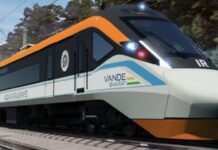Chennai: The Bengaluru-Chennai access-controlled highway, which will connect the two metros in two hours, will be launched by this year-end or January 2024, said Union minister for road transport and highways (MoRTH) Nitin Gadkari at a function here on Thursday.
“Also, with the massive infrastructure being built across the country, Chennai will soon be connected with Delhi through the access-controlled highway project,” he said, adding that he reviewed the progress of National Highways projects in Chennai the same day.
Also Read: NHAI puts off toll tax hike on Bengaluru-Mysuru expressway
He called up on the travel industry to plan launching luxury buses and sleeper coaches on Chennai-Bengaluru sector. The minister was there to attend the 75th anniversary celebrations of Ashok Leyland here.
The minister also launched the Ashok Leyland’s IeV series, which is the first electric commercial vehicles in its category. On the occasion, Gadkari said there’s a great requirement for electric buses in the country. “We are making good roads. We are connecting Delhi to Chennai via Surat, Nasik, Ahmednagar, Kurnool, Chennai (and beyond to), Kanyakumari, Thiruvananthapuram, Kochi (and also to) Bengaluru and Hyderabad, through the access-controlled highways project,” he said.
Citing the MoRTH’s bid to build an electric cable highway between the national capital and Jaipur, the minister urged Ashok Leyland and other players to produce vehicles that could use bio fuels or alternative energy, such as e-vehicles, in a big way and help the Centre achieve the goal of a five-trillion-dollar economy.
Also Read: Centre justifies Dwarka Expressway cost rise amid claims of scam
“I am working on diversification of agriculture to energy and power sector since 2004. Ten days ago, I launched a 100 percent bio-ethanol vehicle. In Bengaluru I had launched Ashok Leyland’s vehicle which can run on methanol-blended fuel. My dream is to ensure the production of methanol trucks in India,” Gadkari said.
The Indian Oil Corporation (IOC) is producing bio-ethanol-based fuel for automobiles and ethanol aviation fuel too. “I am working on diversification of agriculture to energy and power sector since 2004. Ten days ago, I launched a 100% bio-ethanol vehicle. In Bengaluru I had launched Ashok Leyland’s vehicle, which runs on methanol-blended fuel. My dream is to ensure the production of methanol trucks in India,” Gadkari said. “Soon, the farmers of Tamil Nadu could help produce ethanol fuel from food grains,” the minister said.
While interacting with the media, Gadkari said he was satisfied over the pace of NH projects and that the work on the Chennai Port-Maduravoyal Elevated expressway project would begin soon. The IeV series launched by the minister are India’s first electric commercial vehicles in its category and aims to provide efficient and eco-friendly solutions for last-minute transportation needs. The leV, produced by Ashok Leyland’s EV arm Switch Mobility, presents an attractive value proposition for MSMEs, cottage industries, and e-commerce in the country with low total cost of ownership coupled with a commitment to high uptime.
Also Read: Cabinet nod to Metro’s expansion to Cyber City & Dwarka expressway
This is India’s first fuel cell bus. Also, Ashok Leyland unveiled a new hydrogen fuel cell bus, the country’s first hydrogen internal combustion engine truck, on the occasion. “As we celebrate this milestone (of 75 years)…we renew our pledge to further shape the future of the CV (commercial vehicle) industry,” Ashok Leyland’s chairman Dheeraj Hinduja said, adding, the company was working with the vision to pioneer in sustainable transportation solutions and to support India’s economic development for years to come.
Chief executive officer of Switch Mobility Mahesh Babu said the launch of the Switch IeV series electric vehicles is a defining moment for the EV arm, having established a strong reputation in the e-bus market.
Benefits of Chennai-Bengaluru access-controlled highway
Reduced Travel Time: The Bengaluru-Chennai expressway is expected to significantly reduce travel time between the two cities. Once inaugurated in January 2024, it will take only 2 hours to travel the distance, making it a much faster option compared to other modes of transportation.
Also Read: MoRTH approves ₹1895.26-Cr NH projects, tweets Gadkari
Faster than the Vande Bharat Train: Currently, it takes around 4 hours for the Vande Bharat train to travel between Bengaluru and Chennai. With the expressway, travelers can look forward to saving half the time it takes by train.
Comparable to Flight Time: The expressway’s 2-hour travel time makes it almost comparable to taking a flight between the two cities, which typically takes around 1 hour. This will provide travelers with an alternative option to flying, especially for shorter distances.
Also Read: Stage set for building 1st eway in Bihar; NHAI to do feasibility study
Enhanced Connectivity: The expressway will provide improved connectivity between Bengaluru and Chennai, benefiting both cities economically by facilitating faster movement of goods, services, and people.
Increased Tourism Potential: The reduced travel time between the two cities can potentially boost tourism in the region. With quicker access to attractions and landmarks, tourists can explore more places within a shorter span of time.
Infrastructure Development: The construction of the expressway showcases significant infrastructure development in the region. This not only benefits commuters but also creates employment opportunities and contributes to the overall growth of the area.




